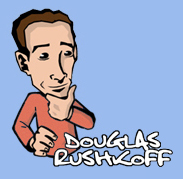 One-time keyboard player for industrial band Psychic TV, Douglas Rushkoff’s 10 best-selling books on new media and popular culture have been translated into more than 30 languages.
One-time keyboard player for industrial band Psychic TV, Douglas Rushkoff’s 10 best-selling books on new media and popular culture have been translated into more than 30 languages.
He is technology and media commentator for CNN, and has taught and lectured around the world about media, technology and economics. His latest book: Program or Be Programmed: Ten Commands for a Digital Age dissects our relationship with computer code and is a call to arms in our digital age.
So, Rushkoff, do you seriously believe regular, normal people should have to learn to program?
Yes. If not today, then next year, next decade, or next century. When humans acquired speech we didn’t learn just how to listen, but also how to talk. When we acquired text we didn’t learn just how to read, but how to write. Now that we’ve built computers, we should know not just how to be users, but how to be programmers.
It could take a while – until a group of hackers take down the banking system, or simply until people realise that we are inhabiting man-made environments that we know little or nothing about. We don’t realise what the worlds we are living in were built to do.
Kids spend time in Facebook actually believing the purpose of the program is to help them make friendships. They don’t realise it’s there to monetise their social graphs. They aren’t the customers; they are the product. So even if they can’t write programs, they need to recognise the biases of the programs they’re using. They need to know what is a pre-existing condition of the universe, and what is simply code.
Isn’t that like asking everyone who drives a car to also know how to be an auto mechanic? Why can’t we just be drivers instead of mechanics?
I’m happy for us to be drivers, but we’re not. I’m not talking about a distinction between mechanic and driver, where the user is supposed to know how to take apart his laptop and replace the power supply or the RAM.
I’m talking about the difference between a driver and a passenger. The passenger is not the true user of the car. If the passenger knows nothing about the car or how it works, he must depend completely on the driver for his reality. Is there a supermarket near here? Where are you taking me?
The user with no programming knowledge at all may as well be sitting in the back seat of the car, with curtains covering the windows – or video screens in place of the windows. He may be going to the best places in the best ways, or he may not. He has to trust his driver.
I don’t trust the drivers of our software and websites any more than I trusted the people making game shows and commercials for TV. I’m sure they’re nice people, but I don’t believe they all have my best interests at heart.
I think at least some of them are more interested in making money for their corporation than they are in serving me or my potential as a human being. I hope that doesn’t sound outrageously cynical. But I think most readers would have to agree that at least a few of the many companies out there are thinking of profit over humanity.
And if that’s true, then we might want to be in a situation where we have some capacity to gauge whether the programs we are using to express ourselves, engage with others, and make a living are working on our behalf.
Have you changed? Your early books make it sound like you like technology; in this interview, you make it sound like you don’t like technology.
No, not at all. I still like technology, and I still like people. I just don’t like what many people and companies are doing to one another through technology. I think I may have been more hopeful in the past that these technologies would be intrinsically liberating. I thought they would free many people from the constraints of exploitative “market thinking.”
But in many cases, they seem to have only amplified the effects of the market. People are not really gaining more time or agency so far. And I think the path toward using technology in more personally fulfilling ways begins with understanding what these tools are and how they work.


